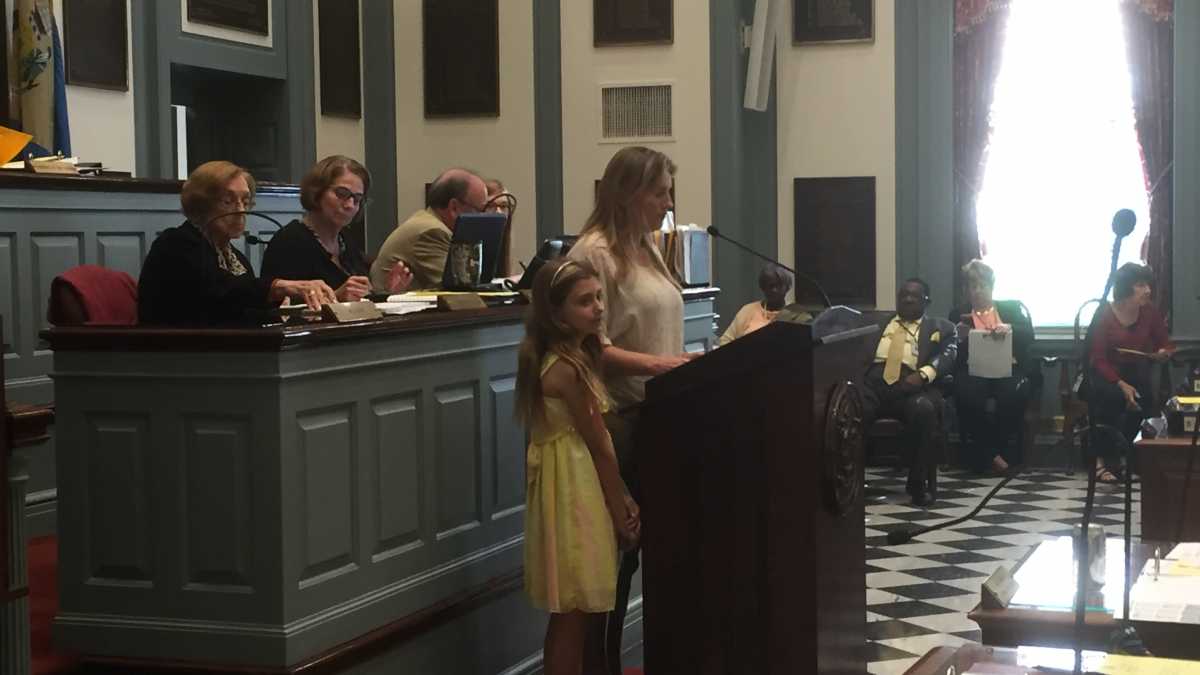Delaware approves bill allowing children to use medical marijuana on school property

Rylie Maedler and her mother
Lawmakers have passed a bill allowing children to use medical marijuana on school property.
The Delaware General Assembly passed legislation allowing Delaware children who legally use medicinal marijuana oil for their illnesses to have access to their medicine on school property.
The House passed Senate Bill 181, sponsored by State Sen. Ernie Lopez, R-Lewes, with an almost unanimous vote, with one legislator absent, on Thursday. Gov. Jack Markell, D-Delaware, is expected to sign the legislation into law at the beginning of the school year in September.
“It feels terrific. This bill came about as a result of a lot of hard work. It’s a good bi-partisan legislation that’s going to help kids and families in Delaware,” Lopez said.
“This was a collaborative approach, which is the way it should be, when it comes to the health of our children. And in these very polarized political times this is another example of how we continue to show that we come together on behalf of our constituents and I’m really proud of that.”
Last year Lopez introduced legislation that expanded the use of medicinal marijuana oil to those under 18, if they have intractable epilepsy and certain muscle disorders. The legislation known as “Rylie’s Law” passed in the Senate and the House almost unanimously with one legislator absent.
Medicinal marijuana experts say oils do not cause the consumer to become high, and are a safe option for children with various medical conditions.
Lopez’s new bill allows for minors with a state-issued medical card to have access to cannabis oils on school property.
An amendment introduced last week makes clear the medical marijuana oil caregiver is not affiliated with the school, unless a parent or legal guardian of the child.
The Delaware Department of Education supports the legislation.
“The department worked with Sen. Lopez to draft legislation that will meet a need identified by one of his constituents and is in support of the bill,” said spokeswoman Alison May in an email statement.
Delawareans over 18 have been able to receive doctor-recommended medicinal marijuana with a state-issued ID since July 2012.
If a doctor concludes their patient has one of the qualifying conditions they can sign off on the ID, and then the patient can take the ID to the state-run dispensary in Wilmington to receive the medication.
The Division of Public Health, which oversees the First State Compassion Center dispensary, plans to complete contract negotiations for two new centers in Kent and Sussex counties by the end of summer.
There are several current qualifying conditions for adults, including cancer, HIV/AIDS and intractable epilepsy.
According to the Division of Public Health there currently are 1,550 card holders in the state, and it expects that number to increase. Currently only 0.3 percent of Delawareans under 18 hold the ID card. The largest percentage, 28.3 percent, are between the ages of 51 and 60. The majority of card holders use the medication for pain—use for muscle spasms falls second and cancer falls third in line.
“Rylie’s Law” was named after Rylie Maedler, who was diagnosed with aggressive giant cell granuloma, which are bone consuming tumors in the face, in 2013. Two weeks after undergoing a seven-hour surgery, Rylie, now 10, began having episodes that were later diagnosed as seizures. The medications she received caused severe mood changes, depression and bone pain.
While researching treatment options, Rylie’s mother Janie Maedler learned about cannabis oil. She joined a support group and Rylie began using it not long after her surgery.
After using the treatment, Maedler said her daughter made major improvements. She then started to slowly ween her off the drug, but her seizures became worse. That’s when she contacted Lopez in an effort to legalize the oil for those under 18.
Before Thursday’s vote on Lopez’s new legislation, Maedler told the representatives that even though her daughter is healthier, she still has to face harsh weather conditions while leaving school to take her medication, sometimes misses classes and at times, feels like an outsider.
“In order to not break the law she has to tough it out and deal with it the best she can,” she said.
Riley also spoke of the need to take her medicine in school, and received an applause from the representatives.
Maedler said she’s proud of her daughter for speaking to the legislators and helping them understand what it’s like to go through this process every day.
She said she’s pleased future cardholders soon will have better access to the care they need.
“This new law will not only be a relief for Rylie, but other more medically fragile children who should never be in harsh weather, who are more difficult to transport off school grounds,” Maedler said.
“It means there will be less disruption to her school day, so she can stay on task, and she will not have to leave the school property in the weather every single day to take her medicine. She will no longer feel singled out due to having to leave every single day and then come back because of her type of medicine.”
Lopez said he’s unsure if there will be similar medical marijuana bills drafted in the near future. Rep. Paul Baumbach, D-Newark, has introduced legislation to add terminal illness to the current list of qualifying conditions for adults and children, however.
“This bill was constituent driven, and this is a responsive building where we respond to our constituents, so as long as there are still some needs out there in the community we will respond to what their needs are,” Lopez said. “But today is a great day for our children.”
WHYY is your source for fact-based, in-depth journalism and information. As a nonprofit organization, we rely on financial support from readers like you. Please give today.





